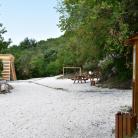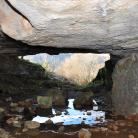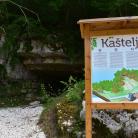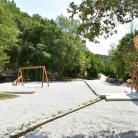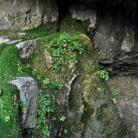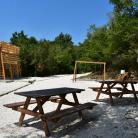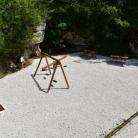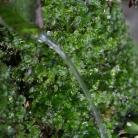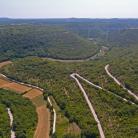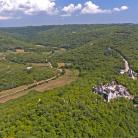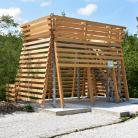Kašteljir
Kašteljir is a prehistoric archaeological site which is situated under the former hill-fort (gradine) settlement.
Ever since the prehistorical times caves and semi-caves of Lim Valley have served as natural sanctuaries for the first hunters and gatherers, while the fruitful valley with numerous water springs made this area convenient for living.
Kašteljir is a fort near Kanfanar with a sequence of smaller water springs nearby, as well as with the ruins of the St. Jacob the Apostle church and the church of st. Agatha. In the past, the location of Kašteljir was of interest because it was situated on the road of strategic importance, which led through the Lim Valley, from the sea (Lim Channel), towards the inland of Istria.
The oldest archaeological finds - some pieces of pots - are the major proof that the area of Kašteljir used to be inhabited in the Roman times. According to the finds, life returned again in the end of the 9th century, when a Benedictine convent was founded nearby.
Must see in Kašteljir:
EUROPEAN FIRE-BELLIED TOAD (Bombina bombina)
The European fire-bellied toad is a species from the bombinatoridae family. This interesting amphibian is slightly toxic which sometimes also impacts on people. It is an aquatic species that lives in clear stagnant, or in slow flowing, waters. It eats algae and water plants and is a strictly protected species
LIM BAY
Lim bay is a dry karstic valley which takes a wavy form. It is the terrestrial continuation of the flooded end part of the Lim channel. It reaches as far as the central part of Istria and the village of Beram, and is 31 kilometers long. This area is protected as a significant landscape where you can find 26 caves, 43 ponds, 4 springs and numerous protected plant and animal species...
KAŠTELJIR ONCE
The position of Kašteljir in the past was extremely important because of the nearby water spring. Kašteljir had an important strategic role in controlling the main way that led from the sea to the center of Istria and vice versa. In the past Kašteljir's spring supplied families from Kanfanar and surroudings with water and up to only few decades ago people would patiently queue with their animals for this precious water.












